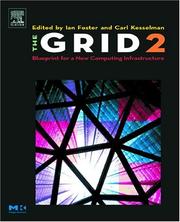| Listing 1 - 2 of 2 |
Sort by
|

ISBN: 1558609334 9780080521534 0080521533 9781558609334 1493303805 9786611022693 1281022691 Year: 2004 Publisher: Amsterdam ; Boston : Elsevier,
Abstract | Keywords | Export | Availability | Bookmark
 Loading...
Loading...Choose an application
- Reference Manager
- EndNote
- RefWorks (Direct export to RefWorks)
The Grid is an emerging infrastructure that will fundamentally change the way we think about-and use-computing. The word Grid is used by analogy with the electric power grid, which provides pervasive access to electricity and has had a dramatic impact on human capabilities and society. Many believe that by allowing all components of our information technology infrastructure-computational capabilities, databases, sensors, and people-to be shared flexibly as true collaborative tools the Grid will have a similar transforming effect, allowing new classes of applications to emerge.
Computer architecture. Operating systems --- Information systems --- gedistribueerde besturing --- virtuele organisatie --- databanken --- datacommunicatie --- infrastructuur --- computernetwerken --- sensoren --- Computational grids (Computer systems). --- Computational grids (Computer systems) --- Grid computing --- Grids, Computational (Computer systems) --- Computer systems --- Cyberinfrastructure --- Cyberinfrastructure. --- Cyber-based information systems --- Cyber-infrastructure --- Electronic data processing --- Information technology --- Computer networks --- Distributed databases --- High performance computing --- Distributed processing
Book
ISBN: 9780262028745 9780262328180 0262028743 0262328186 0262328194 Year: 2015 Publisher: Cambridge, Massachusetts : The MIT Press,
Abstract | Keywords | Export | Availability | Bookmark
 Loading...
Loading...Choose an application
- Reference Manager
- EndNote
- RefWorks (Direct export to RefWorks)
In Knowledge Machines, Eric Meyer and Ralph Schroeder argue that digital technologies have fundamentally changed research practices in the sciences, social sciences, and humanities. Meyer and Schroeder show that digital tools and data, used collectively and in distributed mode -- which they term e-research -- have transformed not just the consumption of knowledge but also the production of knowledge. Digital technologies for research are reshaping how knowledge advances in disciplines that range from physics to literary analysis. Meyer and Schroeder map the rise of digital research and offer case studies from many fields, including biomedicine, social science uses of the Web, astronomy, and large-scale textual analysis in the humanities. They consider such topics as the challenges of sharing research data and of big data approaches, disciplinary differences and new forms of interdisciplinary collaboration, the shifting boundaries between researchers and their publics, and the ways that digital tools promote openness in science.This book considers the transformations of research from a number of perspectives, drawing especially on the sociology of science and technology and social informatics. It shows that the use of digital tools and data is not just a technical issue; it affects research practices, collaboration models, publishing choices, and even the kinds of research and research questions scholars choose to pursue. Knowledge Machines examines the nature and implications of these transformations for scholarly research.
Research --- Cyberinfrastructure. --- Interdisciplinary research. --- Open access publishing. --- Internet research. --- Communication in learning and scholarship --- Data processing. --- Technological innovations. --- Cyberinfrastructure --- Interdisciplinary research --- Open access publishing --- Internet research --- Data processing --- Technological innovations --- Science --- History as a science --- Communication in scholarship --- Scholarly communication --- Learning and scholarship --- Electronic data processing in research --- Open access to research --- Research, Open access to --- Electronic publishing --- IDR (Research) --- Research, Interdisciplinary --- Transdisciplinary research --- Cyber-based information systems --- Cyber-infrastructure --- Electronic data processing --- Information technology --- Computer networks --- Computer systems --- Distributed databases --- High performance computing --- Science research --- Scientific research --- Information services --- Methodology --- Research teams --- Distributed processing --- Research - Data processing --- Research - Technological innovations --- Communication in learning and scholarship - Technological innovations --- INFORMATION SCIENCE/General --- SCIENCE, TECHNOLOGY & SOCIETY/General --- INFORMATION SCIENCE/Internet Studies --- Web research
| Listing 1 - 2 of 2 |
Sort by
|

 Search
Search Feedback
Feedback About
About Help
Help News
News